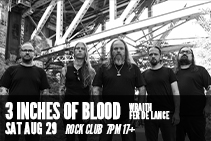The airwaves were rife with so many great eclectic, genre-melding bands in the late ‘80s and early ‘90s that it’s kind of understandable that 24-7 Spyz got lost in the crowd. Their image and sound wasn’t as MTV-ready as the Red Hot Chili Peppers or Faith No More and they didn’t write songs with the same anthemic scope as Living Colour or Rage Against the Machine. While the foundations of 24-7 Spyz lay in a fusion of heavy metal and soul, their excursions into jazz, funk, hardcore punk, hip hop and reggae served to confound, almost as much as it delighted, when the songwriting faltered.
However, inspite of having spent most of the past two decades since the release of 1996’s Heavy Metal Soul By The Pound largely inactive, and inspite of having weathered all manner of personal, physical and psychological struggles, 24-7 Spyz have managed to turn in a career highlight brimming with palpable joy at still being alive and able to make music. And that joy is infectious. While Soundtrack To The Innermost Galaxy was made by the band purely for their fans and for themselves, its sheer joie de vivre is sure to win some new fans.
Like all Spyz records, Soundtrack is highlighted by Jimi Hazel’s signature six-string work—which draws on the acidified grooves of his namesakes, Jimi Hendrix and Eddie Hazel, but ratchets up the heaviness several notches—and his surprisingly warm and soulful voice. His riffing and stylistic shapeshifting is ably matched by the equally nimble and irresistible rhythm section of Rick Skatore on bass and Phillip “Fish” Fisher on drums. This time around Hazel is also joined by Ronny “Head” Drayton, who shares guitar and vocal duties, and a host of collaborators on practically every track.
Despite the multitude of contributors to the album Soundtrack is one of Spyz’ least disjointed sounding records even when it jumps from soulful funk metal to old school hip hop (Anthem), to neo soul (Brothers and Sisters) to Philly soul (Home), to acid jazz and bebop (the title track), and back again (Waiting for the Sun). Somehow, incredibly, none of this genre-hopping sounds forced, awkward or calculated. Throughout its runtime Soundtrack exudes an air of light-hearted organic looseness, almost as if every song here was a live jam improv recording. The only point at which the album gets a little bogged down is on the Eric Garner-inspired “Repeating Myself” which doesn’t have the kind of vocal and instrumental fury that the lyrics seem to demand. Spyz seem much more comfortable preaching the gospel of love than militantly confronting hate.
This relatively minor quibble aside, Soundtrack is a gem of a record that will please anyone with an open mind and ear for diverse music that is fundamentally rooted in heavy metal and soul, but constrained by little else, and whose air of positivity is as addictive as its virtuosity. There might not be a better way to start the new year than by letting The Soundtrack to the Innermost Galaxy put a smile on your face, a bounce in your step, and a groove in your soul.



















